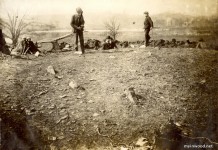 Today’s Inwood is full of green thumbs, mainly volunteers who tend to Bruce’s Garden, nurse sidewalk flower boxes, and cultivate community landscapes enjoyed by all. And while a lucky few have space for a tomato plant or two, today’s edible gardening needs are fulfilled mainly by a thriving farmer’s market which gives Inwood residents access to “local” produce. But there was a time when “local” meant right around the corner.
Today’s Inwood is full of green thumbs, mainly volunteers who tend to Bruce’s Garden, nurse sidewalk flower boxes, and cultivate community landscapes enjoyed by all. And while a lucky few have space for a tomato plant or two, today’s edible gardening needs are fulfilled mainly by a thriving farmer’s market which gives Inwood residents access to “local” produce. But there was a time when “local” meant right around the corner.
 As recently as the early 1930’s Inwood was home to one of Manhattan’s last, if not the last, working farms. Inwood resident Josephene Benedetto Bliani sat down with oral historian Jeff Kisseloff in 1987 and described life on her family’s farm on Broadway and 214th.
As recently as the early 1930’s Inwood was home to one of Manhattan’s last, if not the last, working farms. Inwood resident Josephene Benedetto Bliani sat down with oral historian Jeff Kisseloff in 1987 and described life on her family’s farm on Broadway and 214th.
“Our farm had very good soil. We had the best corn. They were small because there wasn’t a lot of room, but they were round and delicious. We raised all different kinds of vegetables. We had tomatoes, corn, lettuce and string beans. We had pear trees and peach trees, and we had chickens, rabbits and a goat. We rented a horse when we had to do the plowing. My parents earned their living selling the eggs, vegetable and fruit.
Chickens were nasty and dirty. I stayed away from them, for sure.

My brothers did most of the farm work. I helped sell the vegetables from the farm stand. Everything was cheap. The eggs were fifteen cents a dozen. Corn was a dozen ears for a quarter. Tomatoes were five cents a pound-very cheap, but delicious.

It was just a farm. It wasn’t a very big farm-only a city block. From 213th to 214th and from Tenth Avenue to Broadway. For me it was just a place to live. We moved there in 1924, when I was three. My father was an ice man until the Frigidaires came in and that went kaput. That’s why they took the land.
Our house didn’t have electricity or gas or anything. We had to bring everything in.”
Note: The accompanying photos likely portray the Benedetto farm. They were all taken in the same area she describes between 1927 and 1933.









Here’s another pic of Inwood farming from 1917. Will a link work here Cole? See if this works. Otherwise head to http://www.corbis.com and search for Inwood.
Inwood farming/gardening in 1917
That is my great-grandfathers farm my grand told me about how my greatfrandfather Pasquale Benedetto used to sell out the farm lot for people to park during the football games at Colombia university
We are related! I’m a great granddaughter of Jennie Benedetto-Pasquale’s oldest daughter! I would love to hear more stories about the family if you know them!
Would love to know if Pasquale had any relatives in the Bronx. My grandparents settled there. My grandfather Giuseppe had a brother named Pasquale. I know the “Di” was dropped from some of our cousins’ records.
I remember this farm from looking out the bedroom windows on 213 th St. Living with the farm and the Isham Park on Broadway I could pretend I lived in the country. But then the elevated train on 10th Ave would bring me back to reality very quickly! Love sliding down the hill from the Broadway end of the farm down to the veggies and then a few years later the parked cars. Lots of caked mud on pants or knees!
I grew up on 215th Street, between Broadway and Tenth Ave. Some of the Benedetto family lived in the same apartment house as I did, #500 W. 215th St. Time period late forties and fifties. Kids being kids mischief was on our minds. That would be running through the farm which was off limits to little brats. Tootsie, a little old Italian man, I guess he was the Grandfather, would chase us and throw rocks at us. What great fun!
I grew up across from the farm at 5025 Broadway in the ’40s and ’50s. Then the farm occupied the entire block. I think it was the late ’40s when a Ford dealer had a used car lot on Broadway. It was replaced by the New York Telephone building, which had the boiler explosion in 1962. The phone company eventually took over the entire block for their park.
I recall the Benedettos brought over two children of relatives from Italy in Feb. 1951. Carlo and Damiana Panza. They started school at Good Shepherd Where my sister and I attended. They didn’t speak a word of English, but they sure learned fast.